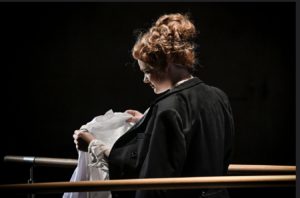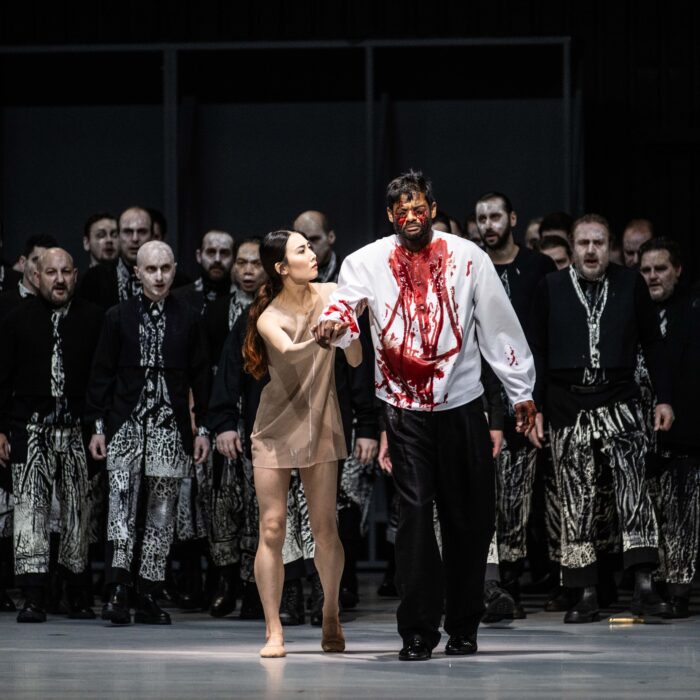
Janacek Brno Festival 2022 Review: The Weeping Fountain
By Alan Neilson(Photo: Festival Janacek Brno)
In 1902, Janáček’s daughter, Olga, then only 20-years-old, went on a trip to visit her uncle in St. Petersburg. Being a keen admirer of Russia, she was planning to spend an extended period in the Russian capital to deepen her knowledge of the language and its culture, but events took a devastating turn: she caught typhus and was forced into an early return to Brno. Unfortunately, Olga’s health was only to worsen, while Janáček and his wife were forced to watch helplessly as her suffering increased. Within a few months, she was dead. Her short life was over!
The effect on both parents was crushing. Janáček’s was to pour out his grief into his composition “Elegy on the Death of Daughter Olga” and into his opera “Jenufa” which he was writing during this period. His housekeeper, Mara Stejskalová, recalled that “…he put the suffering of his daughter into Jenufa’s suffering. And the tough love of Kostelnicka – that’s him, there is much of his own character in this part.”
Throughout her life, Olga’s relationship with her father had been founded on a deep love and respect, although it was not without its heated moments, when they would clash over her love for young men as well as on other matters. It is this relationship that Jan Cimir, Tomáš Krejčí and Hana Mikolášková wanted to explore in their short opera “The Weeping Fountain,” written for the students of Brno Conservatory, an institution itself established by the composer in 1919, for a performance at this year’s Janacek Brno Festival.
The opera focuses on Olga’s fateful trip to St. Petersburg, during which for the first time in her life she assumed a degree of independence from Janáček. We learn of Olga’s thoughts about her relationship with her father by way of a series of letters that she reads to the audience. It is in one sense an early 20th century road trip, albeit one taken by train.
The music is a collage of pieces by slavic composers put together by Krejčí, in which Olga is represented by the Russian music of Musorgsky and Tchaikovsky, while Janáček, although not appearing as a physical presence until the very end, is represented by his own music. There was also a single piece by Dvorák. While it is Olga who dominates the work, there are also a few other smaller roles, including the amorous Vorel, her mother, and the maid, Mara Stejskalová, who enter the drama via the letters. There is also a significant part for what is quite a large chorus.
Mikolášková Oversees An Imaginative Staging
Director Hana Mikolášková produced an imaginative and lively rendition with plenty of onstage movement, which compensated for what might otherwise have been a static work rooted too rigidly in the spoken text of the letters. The focus was almost entirely on Olga for the entire performance, in which the chorus, expertly choreographed by Ladislava Košíková, was used to give physical form to her emotional state and inner thoughts.
The chorus also often acted as the voice of Janáček, which allowed the relationship with her father to be magnified and, as such, moved between support and opposition. Moreover, the ever-present chorus ensured that Janáček’s presence was always close at hand. Occasionally, his image was manifested in the form of a puppet-like figure created from his clothes and moved by members of the chorus. Olga could not escape him; she could see and hear him everywhere. It was, at times, a suffocating relationship.
Katerína Doleželová’s stage and costume designs were simple, yet they worked well. For the most part, the stage was empty apart from some rails used in dance schools, which were moved easily to create a visual context, such as train carriages.
The costume for Olga was a traditional, early 20th century dress and blouse, while the chorus was outfitted in simple modern dance costumes. The contrast again helped successfully focus all the attention on Olga.
A Very Encouraging Performance From Košnárová
Three presentations of the work were given during the festival, each with a different singer in the role of Olga. This review is of the second of the three, in which Olga was played by Edita Košnárová.
It was an impressive performance on many levels. Not only did she display a surprising degree of confidence for a singer with so little experience, but her ability to create a believable, nuanced character was admirable. Likewise, her singing showed a lot of potential. Yes, there were a couple of wobbles along the way, but nothing that overly detracted from the performance as a whole. She possesses a voice with a pleasing timbre and a natural lyricism, with which she carried the melodies quite beautifully, and was able to imbue the voice with emotional strength. She also articulates clearly so that the words are clearly audible, if not understood, by non-Czech speakers.
Many of the small solo parts amounted to no more than a few lines, although Aleš Musil as the amorous Doctor Vorel had a little more to do. He possesses an engaging singing voice, which he used convincingly to project his feelings for Olga.
The musical accompaniment consisted of a piano and a flute, which worked very well indeed. The simple textures successfully complemented the singing. The playing was not overbearing, yet was able to add color and depth to the singing. Their positioning at the side of the performance area allowed for close communication with singers, which ensured that there was an excellent balance to the performance.
As the fairly intense, fast-moving and engaging work drew towards its conclusion, Olga succumbed to her sickness and died. In an imaginative and sharp piece of directing, her clothes take the form of a puppet-like figure and embrace Janáček who sits at the piano. The roles have now reversed; it is now Olga who will dominate her father’s thoughts.
The opera finished with an emotionally poignant rendition of “Elegy on the death of daughter Olga,” sung by the chorus.
Lasting only approximately one hour, “The Weeping Fountain” proved to be an imaginative and captivating work. Not only did it contain some brilliant music, but it was also very well performed. Moreover, the music was sensitively chosen and positioned to create a dramatically fine piece of theatre, which successfully realized the aim of bringing Olga and Janáček’s relationship to the stage.
The audience certainly loved it and showed its approval with extended applause at the final curtain.



